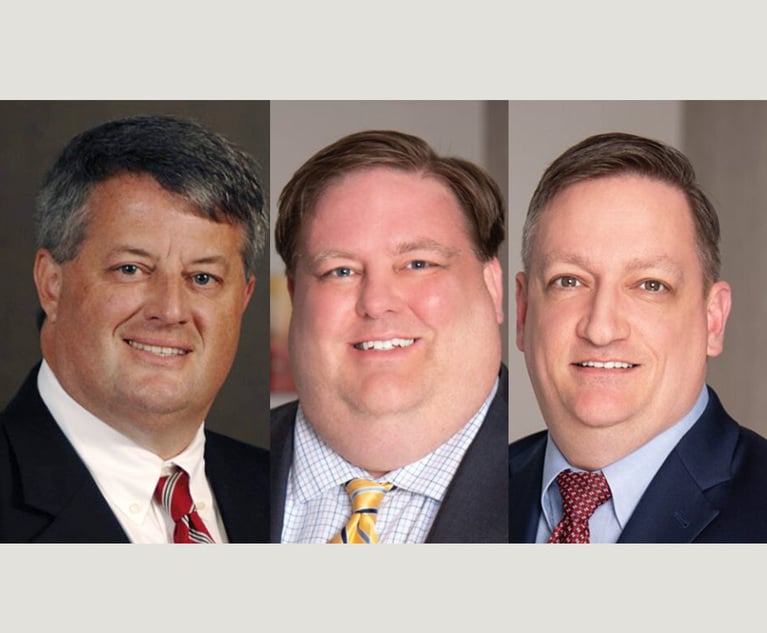 Matthew Cavedon (Courtesy photo: Scott Rogers)
Matthew Cavedon (Courtesy photo: Scott Rogers)No Elephants: Women Who Have Abortions Won't Face Criminal Charges Under Georgia's New Law
"[C]ourts are loath to expand criminal responsibility beyond its traditional reach without a clear legislative command. Georgia's criminal laws about abortion and murder have never traditionally reached women who have abortions."
May 14, 2019 at 05:24 PM
7 minute read
Justice Antonin Scalia once said that legislatures do not “alter the fundamental details” of the law “in vague terms or ancillary provisions”—that is, they don't “hide elephants in mouseholes.”
Critics of Georgia's new abortion law, like Slate's Mark Joseph Stern—who is worried that the state just made women who have abortions eligible for the death penalty—should take heed. Mr. Stern relies on the interpretation given to HB 481 by a smart acquaintance of mine, Andrew Fleischman. Because I both support the new law and oppose criminal penalties for women who have abortions, Mr. Fleischman's take gave me concern. But when I looked at the text of HB 481, and Georgia law more generally, my fears dissolved. HB 481 does not put women who have abortions in prosecutors' crosshairs. (David French reached the same conclusion, for many of the same reasons, in the National Review on May 11.)
Start with HB 481 itself. Three different parts of it that have raised worries. First, there is a lengthy introduction containing the General Assembly's findings. This section references the U.S. and Georgia Constitutions, then declares the Legislature's policy “to recognize unborn children as natural persons.” This is a moral stand, not law with teeth. There is no such crime as violating an introductory policy statement.
Another section refers to “the homicide of an unborn child.” But this provision is not criminal. It amends the Georgia law allowing parents to recover money from someone who kills their child. Unborn children have been covered under this since at least 1955. HB 481 just expands it beyond a child who has “quickened” in the womb to the more modern 20-week mark.
The most controversial part of HB 481 is the language amending the legal definition of personhood. The law in question is entitled, “Classes of persons generally; corporations deemed artificial persons; nature of corporations generally.” As the title suggests, it is extremely general. Before HB 481, it stated that “there are two classes of persons: natural and artificial. Corporations are artificial persons,” and these can be “changed, modified, or destroyed at the will of their creator.” HB 481 inserts two new sections that are relevant here. One defines “natural person” to include “any human being including an unborn child.” The other says that unborn children with heartbeats are to be “included in population based determinations,” such as school-funding formulas.
Neither of those changes directly affects criminal law. The statute defining personhood says absolutely nothing about what Georgians can and cannot do to persons. Indeed, it would be absurd for it to: Half the point is that corporations can be legal persons for certain purposes. (All the hubbub about the Citizens United decision aside, this has been the law since medieval times. It has never meant that you can commit murder against a company.)
The change to legal personhood is a bold stand. But it is not the sea change in criminal law that Mr. Fleischman thinks it is. First, note the criminal statutes that are not even arguably changed by HB 481. The law against assaulting an unborn child specifically says that it does not apply to “conduct relating to an abortion,” or to “any woman with respect to her unborn child.” The same exemptions are provided in the statute banning battery of an unborn child. And in Georgia's law against feticide—which provides for life sentences for those who kill others' unborn children “at any stage of development.” (Note that this broad class dates from before HB 481.)
What about the statute criminalizing unlawful abortions? It does not contain any exemptions. But it only bans administering an abortifacient “to any woman,” or performing a procedure “upon any woman.” The Georgia Court of Appeals held 20 years ago in Hillman v. State that a woman cannot violate this by doing anything to her own child in utero. The fact that HB 481 contains “an affirmative defense to prosecution” if “a woman sought an abortion because she reasonably believed” it was “the only way to prevent a medical emergency” is a shield for doctors and other medical practitioners—not the woman, who remains beyond the criminal ban's reach. (The same is true of HB 481's other four affirmative defenses.)
What is left is Mr. Fleischman's worry that Georgia's murder statute could now cover women who have abortions. On its face, the murder statute does ban “caus[ing] the death of another human being.” And HB 481 does include unborn children in its definition of natural persons. Does this mean women who have abortions will soon face the death penalty? No. Recall Justice Scalia: Fundamental details of the law—and the law does not have a much more fundamental detail than what counts as murder—do not change through “ancillary provisions.” If ever there was a provision ancillary to the murder statute, it is HB 481's change to the statute identifying you, me, and McDonald's as able to be legal persons for some unspecified purposes. What is more, under a doctrine called “the rule of lenity,” any ambiguities in criminal laws are read strictly against criminal liability. The Hillman decision pointed that out in dealing with abortion. Georgia courts are not going to transplant a broad definition of personhood into the murder statute and let the state start convicting women.
The legal history of the crimes of illegal abortion and murder are another reason not to fear. As Hillman observed, courts are loath to expand criminal responsibility beyond its traditional reach without a clear legislative command. Georgia's criminal laws about abortion and murder have never traditionally reached women who have abortions. Hillman looked at the history of Georgia's criminal abortion bans all the way back to 1876. It found that “courts have consistently ruled that the pregnant woman upon whom the abortion procedure was performed cannot be indicted.” Even more directly, the Georgia Supreme Court held all the way back in 1934 that the murder statute—which has not changed in any relevant way, and which HB 481 does not amend—only covers children who are born and achieve independent blood circulation (Shedd v. State, 178 Ga. 653 (1934). This decision was reaffirmed as recently as 2011, and its rule applies to both malice and felony murder. Georgia courts are not going to throw out 85 years of murder precedent—and 143 years of abortion decisions—in favor of an indirectly drawn inference from an amendment to a noncriminal statute.
Lastly, there is the lay of the criminal law as a whole. The mere fact that the laws prohibiting assaults and batteries on unborn children, feticide, and even abortion do not apply to women who have abortions might be enough even by itself to not expand murder. To apply murder to conduct not covered by more specific statutes would be absurd.
HB 481 is many things. It is the possible trigger for a U.S. Supreme Court case. It is a huge political landmark. And it is a major change in Georgia's abortion laws. But it is not is a threat of criminal prosecution for women who have abortions.
Matthew Cavedon is a criminal defense attorney in Gainesville.
The Daily Report welcomes opinions on this and other subjects. For more information, contact Jonathan Ringel, managing editor, at [email protected].
This content has been archived. It is available through our partners, LexisNexis® and Bloomberg Law.
To view this content, please continue to their sites.
Not a Lexis Subscriber?
Subscribe Now
Not a Bloomberg Law Subscriber?
Subscribe Now
NOT FOR REPRINT
© 2024 ALM Global, LLC, All Rights Reserved. Request academic re-use from www.copyright.com. All other uses, submit a request to [email protected]. For more information visit Asset & Logo Licensing.
You Might Like
View All
Fulton Jury Returns Defense Verdict After Pedestrian Killed by MARTA Bus
8 minute read
'The Best Strategy': $795K Resolution Reached in Federal COVID-Accommodation Dispute
8 minute read
Population and Caseload Boom Birth New West Georgia Judicial Circuit
7 minute read
Trending Stories
- 1Increased Costs Proved a Drag on Profits for PA's AmLaw 200 in 2024
- 2Judicial Ethics Opinion 24-81
- 3Mental Health Issues Don’t Get a Holiday
- 4'It's Got to Be a Wake-Up Call:' Atlanta Attorney Hopes $16M Verdict Spurs Training Changes at Hotels
- 5FTC Bans 'Junk Fees' in Live-Event Tickets and Short-Term Lodging
Who Got The Work
Michael G. Bongiorno, Andrew Scott Dulberg and Elizabeth E. Driscoll from Wilmer Cutler Pickering Hale and Dorr have stepped in to represent Symbotic Inc., an A.I.-enabled technology platform that focuses on increasing supply chain efficiency, and other defendants in a pending shareholder derivative lawsuit. The case, filed Oct. 2 in Massachusetts District Court by the Brown Law Firm on behalf of Stephen Austen, accuses certain officers and directors of misleading investors in regard to Symbotic's potential for margin growth by failing to disclose that the company was not equipped to timely deploy its systems or manage expenses through project delays. The case, assigned to U.S. District Judge Nathaniel M. Gorton, is 1:24-cv-12522, Austen v. Cohen et al.
Who Got The Work
Edmund Polubinski and Marie Killmond of Davis Polk & Wardwell have entered appearances for data platform software development company MongoDB and other defendants in a pending shareholder derivative lawsuit. The action, filed Oct. 7 in New York Southern District Court by the Brown Law Firm, accuses the company's directors and/or officers of falsely expressing confidence in the company’s restructuring of its sales incentive plan and downplaying the severity of decreases in its upfront commitments. The case is 1:24-cv-07594, Roy v. Ittycheria et al.
Who Got The Work
Amy O. Bruchs and Kurt F. Ellison of Michael Best & Friedrich have entered appearances for Epic Systems Corp. in a pending employment discrimination lawsuit. The suit was filed Sept. 7 in Wisconsin Western District Court by Levine Eisberner LLC and Siri & Glimstad on behalf of a project manager who claims that he was wrongfully terminated after applying for a religious exemption to the defendant's COVID-19 vaccine mandate. The case, assigned to U.S. Magistrate Judge Anita Marie Boor, is 3:24-cv-00630, Secker, Nathan v. Epic Systems Corporation.
Who Got The Work
David X. Sullivan, Thomas J. Finn and Gregory A. Hall from McCarter & English have entered appearances for Sunrun Installation Services in a pending civil rights lawsuit. The complaint was filed Sept. 4 in Connecticut District Court by attorney Robert M. Berke on behalf of former employee George Edward Steins, who was arrested and charged with employing an unregistered home improvement salesperson. The complaint alleges that had Sunrun informed the Connecticut Department of Consumer Protection that the plaintiff's employment had ended in 2017 and that he no longer held Sunrun's home improvement contractor license, he would not have been hit with charges, which were dismissed in May 2024. The case, assigned to U.S. District Judge Jeffrey A. Meyer, is 3:24-cv-01423, Steins v. Sunrun, Inc. et al.
Who Got The Work
Greenberg Traurig shareholder Joshua L. Raskin has entered an appearance for boohoo.com UK Ltd. in a pending patent infringement lawsuit. The suit, filed Sept. 3 in Texas Eastern District Court by Rozier Hardt McDonough on behalf of Alto Dynamics, asserts five patents related to an online shopping platform. The case, assigned to U.S. District Judge Rodney Gilstrap, is 2:24-cv-00719, Alto Dynamics, LLC v. boohoo.com UK Limited.
Featured Firms
Law Offices of Gary Martin Hays & Associates, P.C.
(470) 294-1674
Law Offices of Mark E. Salomone
(857) 444-6468
Smith & Hassler
(713) 739-1250






